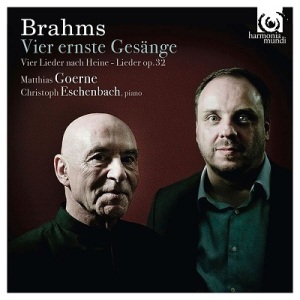In sports there are awards for MVP or best player in this or that position, or there are world rankings to confirm greater or lesser status on competitors. If such things existed in the world of singers, and if I were in charge of assigning those rankings, world’s No. 1 baritone would be Matthias Goerne, and this new Brahms recital would be exhibit A, although there are many other recordings–and notable concert performances–that could serve the same purpose (his performance last fall in Bartók’s Bluebeard’s Castle in Boston being one of the more recent). Just begin at the beginning, the disc’s opening “Wie rafft’ ich mich auf in der Nacht”, whose alternately assertive and more reflective character shows singular aspects of Goerne’s expressive range, alluring tone, and thoughtful, natural way with phrases and inflections. Continuing throughout the recital, you notice that he never throws away a note or syllable or phrase ending; rather, he fully regards and gives the poetic text–and Brahms’ musical realization–their due.
There are plenty of moments–and entire songs–I could mention as highlights, but as an example of pure mastery of the song combined with sheer beauty of voice, go to the last of the Op. 32 songs, “Wie bist du, meine Königin”–as personal and heartfelt a performance as you will hear. Bad singing or an unpleasant voice can usually be described in a word or two: strident; shrill; harsh; wobbly; hooty; throaty; nasal; careless, faulty, or uneven technique; intonatiionally challenged; colorless. But it’s impossible to produce a word, or even several words, to describe a great voice or vocal performance–there are too many factors that are at play, not least among them the mysterious and magical, the innate and unteachable, the extra-technical, the things that are uniquely related to the instrument and the unique human attached to it.
As with athletes, fans of singing will disagree and argue as to the merits of this or that performer; but it’s hard to imagine anyone listening to “O Tod, wie bitter bist du” (from Op. 121) could not agree: this is a consummate master of singing, of lieder, of Brahms, of vocal color, of style, of text. And his piano partner, Christoph Eschenbach, must also be given high praise for his alternately robust and refined collaboration, beautifully recorded in a Berlin studio. Singing Brahms requires a commitment different from, say, singing Schubert. Neither is easy–but to convey these songs straight to the heart of the listener as Goerne does is the mark of an extraordinary artist. Perhaps we should come up with a new designation: MVB–Most Valuable Baritone. Highly recommended.
































